Division of Reproductive Health Science研究室の紹介
Visiting Professor Kazumi Hoshino, Ph.D.
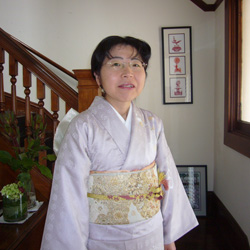
Email:
RESEARCH INTERESTS
Intergenerational support and wellness among immigrant families in the United States, China (Taiwan), and Japan is funded by the Japan Society for Promotion of Science (Principal Investigator: Kazumi Hoshino, Co-Investigator: Kazutomo Ohashi, Overseas Collaborator: Winston Tseng, 2018-2021 Grant-In-Aid for Scientific Research (C), 18K03035 ).
Professor S. Leonard Syme who is Professor Emeritus of Social Epidemiology at the School of Public Health at the University of California at Berkeley and Professor Winston Tseng who is Associate Professor of Research at UC Berkeley School of Public Health invited Principal Investigator as a Visiting Scholar (2010-2011). Professor Syme, Professor Tseng, and Principal Investigator conducted International Symposium on Healthy Aging in the United States, Sweden, and Japan with Professor Andrew E. Scharlach at UC Berkeley School of Public Health. Principal Investigator was granted a Residential Faculty Fellowship Award by the Institute of East Asian Studies at the University of California at Berkeley and served as a Residential Faculty Fellow (2011-2012).
Professor Andrew E. Scharlach who is Professor of Gerontology at UC Berkeley School of Social Welfare and Principal Investigator edited a book entitled Healthy aging in sociocultural context, with contributions from Professor Tseng and the Swedish and Japanese experts of gerontology. The original English book was published by Routledge in 2012, and the Japanese version was published in 2013.
Principal Investigator conducted another research project on cultural identity, intergenerational relationships, and intergenerational support among Chinese, Japanese, and Hispanic Americans with Professor Tseng (2010-2011 General Research Grant (B), Foundation of the Japanese Certification Board for Clinical Psychologists). The book was published as International migration and wellness innovation in the United States, Sweden, and Japan in 2017, which was funded by the Japan Society for Promotion of Science (Principal Investigator: Kazumi Hoshino, Co-Investigators: Professor Tseng, Professor Dolores Gallagher-Thompson, and Dr. Nancy Hikoyeda, Grant-In-Aid for Scientific Research for Publication, 16HP5171).
CURRENT RESEACH PROJECT
Intergenerational support and wellness among immigrant families in the United States, China (Taiwan), and Japan has been conducted to accomplish the following objectives.
1.Objectives
Intergenerational family support between children, adults, and elderly parents have changed through lifespan development. As children grow, physical, informational, financial, and psychological support from adult parents to children has decreased, while support from children to adult parents has increased. Specifically, intergenerational support has drastically transformed among immigrant families due to differences in cultures, languages, educational systems, and health care policies in their home countries and their new countries.
In particular, when elderly parents need care-giving from adult children, family members face crises. Adults are required to cope with elderly parents’ expectations and to accommodate with support for children (Hoshino, Tseng, Gallagher-Thompson & Hikoyeda, 2017a, 2017b). If adult immigrants correspond to elderly parents’ expectations, (1) they temporarily return to their home countries (i.e., international care-giving) and/or (2) their elderly parents immigrate to their adult children’s countries (i.e. immigration due to care-giving). On the other hand, other immigrants may provide only psychological support and/or financial support for their elderly parents and may ask their siblings in their home countries to provide physical and informational support and care for their old parents. In addition, decision-making of care-giving among immigrant families is affected by sociocultural contexts on intergenerational support in each country, including individualism and groupism, lifespan developmental perspectives, attitudes toward older adults, and images of care-giving. Hence, intergenerational support among immigrant families interacts with cultural identity development of children, adults, and elderly parents and sociocultural contexts. However, research on intergenerational support and wellness among immigrant families is underdeveloped in Japan.
Wellness is multidimensional concept of health perspectives and transcends the WHO’s definition of health (WHO, 2015). Wellness is an active process of making decision aiming at health as well as well-being and a dynamic process of human development and changes (SHCS, UCD, 2015). Substance Abuse and Mental Health Services Administration (SAMHSA, 2015) has developed Wellness Initiatives and has embraced wellness promotion and healthy selection in daily lives in terms of eight dimensions of wellness (Swarbrick, 2006). Wellness consists of eight dimensions: Emotional; financial; environmental; social; intellectual; spiritual; physical; and occupational. Since wellness is useful and meaningful concept, empirical research on wellness is expected to shed light on multicultural family issues in Japan and around the world.
This study identifies associations between wellness and intergenerational support of three generations (i.e., children-adults-elderly parents) among Japanese Americans in the United States, Japanese Chinese in China (Japanese Taiwanese in Taiwan), and Japanese adults in Japan in terms of semi-structured interviews. The study also clarifies interactions between international migration, intergenerational support, and wellness in comparison with Japanese descendants in the United States, China (Taiwan), and Japan.
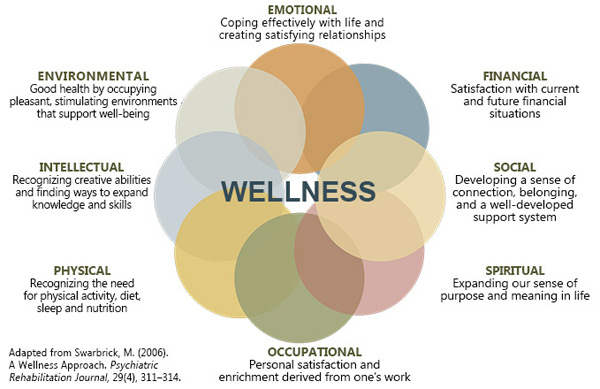
2.Research Activities
1)International Seminar
As a part of our research activities, we conducted the 2018 International Seminar on interventions and educational programs of intergenerational support for diverse families in the United States at the Graduate School of Medicine at Osaka University on July 22, 2018. Principal Investigator appreciates sponsorship of Division of Reproductive Health Science in the Department of Health Sciences at the Graduate School of Science at Osaka University. Principal Investigator also wishes to thank you for co-sponsorship of Health Research for Action Center at the School of Public Health at the University of California at Berkeley. Division of Narrative and Qualitative Research, Japan Society of Developmental Psychology gives support to the International Seminar. In the seminar, the presenter was Professor Winston Tseng, Chair was Professor Kazutomo Ohashi, and Discussant was Principal Investigator.
Professor Tseng made an excellent presentation concerning maternal infant health and early childhood interventions in the United States. Chair and Discussant promoted insightful discussions, which could develop great progress of our research. Overseas and Japanese researchers and health care professionals were inspired by the successful seminar, including medicine, nursing, public health, language and cultural studies, English language education, business management, dietetics, and lifespan developmental psychology.
Flyer of the 2018 International Seminar (pdf file)
Slides of Professor Winston Tseng (pdf file)
Slides of Kazumi Hoshino (pdf file)
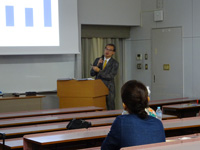
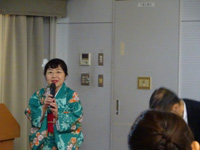
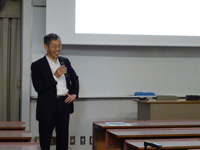
2)Selected Publications and Presentations
(1)Publications
①Book
- Hoshino, K. (2001). Psychosocial development and personality traits among older adults in Japan: Perspectives from lifecycle. Tokyo: Kazamashobo Press.
②Edited Books
- Scharlach, A. E., & Hoshino, K. (Eds.) (2012). Healthy aging in sociocultural context. New York: Routledge.
- Hoshino, K. (Ed.) (2017). International migration and wellness innovation in the United States, Sweden, and Japan. Tokyo: Kazamashobo Press.
③Translation
- Sasaki, T. & Hoshino, K. (Trans.) (2013). Healthy aging in sociocultural context. Japanese version [Kenko Choju no Shakai Bunkateki Bunmyaku]. In A. E. Scharlach, &K. Hoshino (Eds.) (2012). Healthy aging in sociocultural context. Tokyo: Kazamashobo Press.
④Book Chapters
- Hoshino, K. (2012a). Sociocultural support model for healthy aging for older immigrants: Perspectives from the United States, Sweden, and Japan. In A. E. Scharlach, & K. Hoshino (Eds.) Healthy aging in sociocultural context (pp.86-97). New York: Routledge.
- Hoshino, K. (2012b). Healthy aging and policy implications for older immigrants in Japan. In A. E. Scharlach, & K. Hoshino (Eds.) Healthy aging in sociocultural context (pp.71-82). New York: Routledge.
- Scharlach, A. E., & Hoshino, K. (2012). Conclusion. In A. E. Scharlach, & K. Hoshino (Eds.) Healthy aging in sociocultural context (pp.98-106). New York: Routledge.
- Hoshino, K. (2017a). Cultural identity and intergenerational relationships, and social policies among diverse immigrants in Sweden. In K. Hoshino (Ed.) International migration and wellness innovation in the United States, Sweden, and Japan (pp.81-100). Tokyo: Kazamashobo Press.
- Hoshino, K. (2017b). Development of the Multigroup Ethnic Identity Measure-Revised Japanese Version. In K. Hoshino (Ed.) International migration and wellness innovation in the United States, Sweden, and Japan (pp. 101-130). Tokyo: Kazamashobo Press.
- Hoshino, K. (2017c). Ethnic identity, intergenerational support, and psychosocial development among younger and older adults in Japan. In K. Hoshino (Ed.) International migration and wellness innovation in the United States, Sweden, and Japan (pp. 131-160). Tokyo: Kazamashobo Press.
- Hoshino, K. (2017d). International migration, wellness, and social policies in the United States, Sweden,and Japan. In K. Hoshino (Ed.) International migration and wellness innovation in the United States, Sweden, and Japan (pp. 161-180).Tokyo: Kazamashobo Press.
- Hoshino, K. (2017e). Conclusion. In K. Hoshino (Ed.) International migration and wellness innovation in the United States, Sweden, and Japan (pp. 181-190). Tokyo: Kazamashobo Press.
- Hoshino, K., Tseng, W., Hikoyeda, N., & Gallager-Thompson, D. (2017a). Cultural identity and intergenerational relationships among Chinese, Japanese, and Peruvian Americans in the United States. In K. Hoshino (Ed.) International migration and wellness innovation in the United States, Sweden, and Japan (pp. 21-50). Tokyo: Kazamashobo Press.
- Hoshino, K., Tseng, W., Hikoyeda, N., & Gallager-Thompson, D. (2017b). Cultural identity and intergenerational support among Asian and Hispanic Americans in the United States. In K. Hoshino (Ed.) International migration and wellness innovation in the United States, Sweden, and Japan (pp. 51-80). Tokyo: Kazamashobo Press.
(2)Articles
- Hoshino, K., Zarit, S.H., Sundstrom G. et al. (2010). Current and future directions of sociocultural support model for Asian immigrant older adults in the United States, Sweden, and Japan. Annual Research Reports of Center for Research on Asia, Faculty of Humanities and Social Sciences, Shizuoka University, 1, 119-128.
- Hoshino, K., Zarit, S.H., & Nakayama, M. (2012). Development of Gerotranscendence Scale Type 2 Japanese version. International Journal of Aging and Human Development, 75 (3), 217-237.
- Hoshino, K., Zarit, S.H., & Nakayama, M. (2013). Life-cycle images and psychosocial development among adolescents in Japan. Central Japanese (Tokai) Journal of Psychology, 7, 11-22.
- Hoshino, K., & Zarit, S.H. (2014). Development of the Multigroup Ethnic identity Measure-Revised Japanese Version. Central Japanese (Tokai) Journal of Psychology, 8, 28-39.
- Hoshino, K., & Inoue, H. (Trans.) (2015). China worker wellness project, In W. Tseng China worker wellness project (pp.26-31), GLOCOL Booklet, 17, Osaka: Global Collaboration Center, Osaka University.
- Hoshino, K. (2016). Diversity in caregiving for older adults: Community support for migrant care workers in the United States and Japan. Annual Research Report, 14, The Japan Health Foundation, 66-67.
- Hoshino, K. (2018). Multidisciplinary and Multicultural Support Model for Immigrants on Legal Issues. Compilation and Documentation on Refugees and Migrants Quarterly (in press).
(3)Presentations
- Nakayama, M. & Hoshino, K. (2010). Development of the Multi-group Ethnic Identity Measure-Revised Japanese Version. Poster presented at the 74th Annual Meeting of the Japanese Psychological Association (Osaka, Japan).
- Hoshino, K. Nakayama, M., Iwasa, H., & Zarit, S.H. (2010). Multicultural lifelong educational intervention for older adults in Japan. Poster presented at the 63rd Annual Scientific Meeting of the Gerontological Society of America (New Orleans, LA).
- Hoshino, K. (2011).Sociocultural support model for healthy aging for older adults and immigrants in the United States, Sweden, and Japan. Poster presented at the 64th Annual Scientific Meeting of the Gerontological Society of America (Boston, MA).
- Hoshino, K., Tseng, W., Hikoyeda, N., Gallager-Thompson, D. et al. (2012). Cultural identity and family intergenerational relationships among Latino and Asian Americans. Poster presented at the 65th Annual Scientific Meeting of the Gerontological Society of America (San Diego, CA).
- Tseng, W., Hoshino, K., Hikoyeda, N., Gallager-Thompson, D. et al. (2012). Cultural identity and family support exchanges among Latino and Asian Americans. Poster presented at the 65th Annual Scientific Meeting of the Gerontological Society of America (San Diego, CA).
- Hoshino, K., & Zarit, S.H. (2013). Psychosocial developmental images in later life among older adults in Japan. Poster presented at the 66th Annual Scientific Meeting of the Gerontological Society of America (New Orleans, LA).
- Hoshino, K. (2014). Mental health among Asian Swedish in Sweden: Perspectives from cultural identity and intergenerational relationships. International Symposium on mental health among Asian immigrants in the United States, Sweden, and Japan at the 78 th Annual Convention of the Japanese Psychological Association (Kyoto, Japan).
- Hoshino, K. (2017). A multidisciplinary and multicultural support model for immigrants on legal issues in Japan. Poster presented at the 36 th Annual Convention of the Japanese Clinical Psychological Association (Yokohama, Japan).
(4)Invited Lectures
- Hoshino, K. (2010). Healthy aging among older immigrants in Japan (The 2010 International Symposium on Healthy Aging, The University of California at Berkeley, Berkeley, CA, USA).
- Hoshino, K. (2011a). Sociocultural support for healthy aging in the United States, Sweden, and Japan (The Annual Research Meeting, Health Research for Action Center, School of Public Health, The University of California at Berkeley, Berkeley, CA, USA).
- Hoshino, K. (2011b). Healthy aging in sociocultural contexts in the United States, Sweden, and Japan (Residential Faculty Fellowship Awardee Seminar, Institute of East Asian Studies, The University of California at Berkeley, Berkeley, CA, USA).
- Hoshino, K. (2013). Cultural identity and intergenerational support among Latino and Asian Americans (Clinical Thanatology and Geriatric Behavioral Science Seminar, Graduate School of Human Sciences, Osaka University, Osaka, Japan).
- Hoshino, K. (2014a). New International Aging Research in Super-Aging Societies (The Annual Research Seminar of Narrative and Qualitative Studies, Research Center for Ars Vivendi, School of Core Ethics and Frontier Sciences, Ritsumeikan University, Kyoto, Japan).
- Hoshino, K. (2014b). Healthy aging in sociocultural context: Perspectives from the United States, Sweden, and Japan (International Workshop on Healthy Aging and Living Will: Perspectives from the United States, Germany, Sweden, and Japan, Global Collaboration Center, Osaka University, Osaka, Japan).
- Hoshino, K. (2014c). Field work and clinical psychology (Field work: Pain, sadness, and others, Global Collaboration Center, Osaka University, Osaka, Japan).
- Hoshino, K. (2014d). Global Japanese migration, mental health, and healthy aging (Asian American Health and Communities, Dr. Winston Tseng’s Class in the 2014 Fall Semester, in the Department of Ethnic Studies, The University of California at Berkeley, Berkeley, CA, USA).
- Hoshino, K. (2015a). Multidisciplinary and multicultural support for immigrants on legal issues in Japan (The 2015 International Seminar on Multidisciplinary and Multicultural Support for Immigrants in Japan, Global Collaboration Center, Osaka University, Osaka, Japan).
- Hoshino, K. (2015b). Innovation of multicultural support for mental health in the United States and Japan (The 2015 International Symposium on Wellness Innovation in the United States, China, and Japan: Translational Research of Natural Sciences and Social Sciences, Graduate School of Science, Osaka University, Osaka, Japan).
- Hoshino, K. (2016). Diversity in caregiving for older adults: Community support for migrant care workers in the United States and Japan (The 14 th Annual Research Meeting, The Japan Health Foundation, Kyoto, Japan).
- Hoshino, K. (2017). Community support for diverse clinical professionals for healthy aging in the United States and Japan (The 2017 International Symposium on Healthy Aging Promotion for Diverse Older Adults, Graduate School of Human Sciences, Osaka University, Osaka, Japan).
- Hoshino, K. (2018). Interventions and educational programs of intergenerational support for diverse families in the United States (The 2018 International Seminar: Intergenerational support and wellness in the United States, China, and Japan, Graduate School of Medicine, Osaka University, Osaka, Japan).
EDUCATION AND ACADEMIC CAREER
| 1990 | Doctoral Candidate, Graduate School of Education, Nagoya University |
| 1993 | Postdoctoral Research Student, Graduate School of Education, Nagoya University |
| 1997 | Associate Professor, School of Nursing, Mie Prefectural College of Nursing |
| 1999 | Ph.D. (Educational Psychology) Nagoya University |
| 2004 | Associate Professor, School of Humanities and Social Sciences, Shizuoka University |
| 2006 | Visiting Scholar, Department of Human Development and Family Studies, College of Health and Human Development, The Pennsylvania State University (Advanced Overseas Research Grant by the Ministry of Education, Culture, Sports, Science, and Technology) |
| 2008 | Professor, School of Humanities and Social Sciences, Shizuoka University |
| 2010 | Visiting Scholar, School of Public Health, The University of California at Berkeley |
| 2011 | Residential Faculty Fellow, Institute of East Asian Studies, The University of California at Berkeley (Residential Faculty Fellowship Award) |
| 2012 | Visiting Scholar, Institute of Personality and Social Research, The University of California at Berkeley |
| 2013 | Visiting Scholar, Department of Human Development and Family Studies, College of Health and Human Development, The Pennsylvania State University |
| 2014 | Visiting Professor, Global Collaboration Center, Osaka University |
| 2016 | Visiting Professor, Osaka School of International Public Policy, Osaka University |
| 2017 | Visiting Professor, Graduate School of Medicine, Osaka University |


